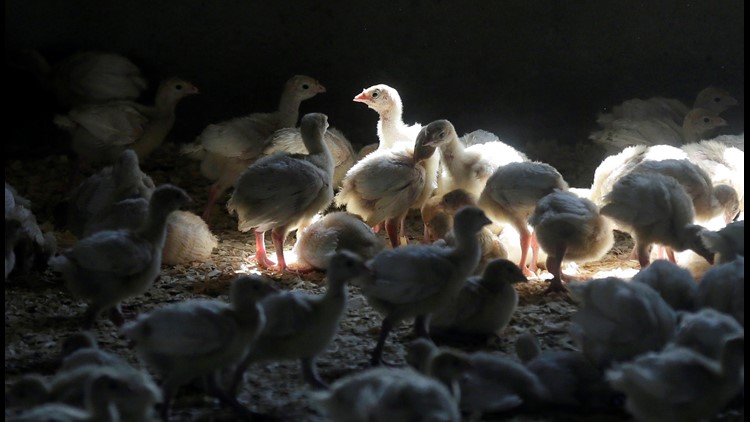PENNSYLVANIA, USA — After discoveries of highly contagious influenza among poultry populations in three states, Agriculture Secretary Russell Redding is issuing a warning to poultry owners in Pennsylvania.
On Feb. 9, the United States Department of Agriculture’s (USDA) Animal Health and Plant Inspection Service (APHIS) confirmed a strain of avian influenza among a turkey flock at an Indiana farm. APHIS also discovered the strain among chickens at two different locations in Kentucky.
Recently, the flu moved a bit closer to home; a mixed group of birds in a backyard flock in Virginia also recently tested positive. All of the flocks with confirmed cases in the three states are in quarantine, and the infected birds will be removed and killed to prevent spreading the disease. 29,000 infected turkeys were already killed at the first confirmed site in Indiana.
Government officials across the nation and in Pennsylvania are encouraging poultry owners to remain vigilant amid the increasing confirmed cases.
The high-alert efforts come after a bird flu outbreak in 2015 killed 50 million birds in the U.S. and made a nearly $1 billion dent in federal funds. The Centers for Disease Control and Prevention noted this strain "do not present an immediate public health concern" since no cases have been detected in U.S. humans.
Although the avian flu strain, HPAI, has not been reported in Pennsylvania, Secretary Redding said poultry owners should "step up biosecurity efforts" in order to protect flocks and, in turn, the commonwealth's $7.1 billion poultry industry.
Redding noted his department is also ramping up prevention and detection efforts.
“The department’s Bureau of Animal Health and Diagnostic Services is on the forefront of controlling and eradicating diseases in livestock and poultry," he said. "Preventing emerging infectious diseases is critical to preventing economic loss to farmers and the commonwealth.”
Redding said if birds start exhibiting symptoms of the flu to report it immediately to any nearby animal health official or veterinarian. Symptoms can include sudden death; lack of energy and appetite; decreased egg production or soft-shelled, misshapen eggs; nasal discharge, coughing, or sneezing; incoordination; and diarrhea.
See below for the Department of Agriculture's list of tips to contain any potential future avian flu cases.
- Keep your distance: Restrict access to your property and poultry or post a biosecurity sign.
- Keep it clean: Wear clean clothes, scrub boots/shoes with disinfectant and wash hands thoroughly.
- Don’t haul disease home: If you, your employees or family have been on other farms, or other places where there is livestock and/or poultry, clean and disinfect your vehicle tires and equipment before returning home.
- Don’t borrow disease from your neighbor: Do not share equipment, tools, or other supplies with your neighbors of other livestock or poultry owners.
- Know the warning signs of infectious bird diseases: Know what diseases are of concern for your flock and be on the lookout for unusual signs of behavior, severe illness and/or sudden deaths. Early detection is important to prevent the spread of disease
- Report sick birds: Don't wait. Report serious or unusual animal health problems to your veterinarian, local extension office, or State or Federal Animal Health officials.



